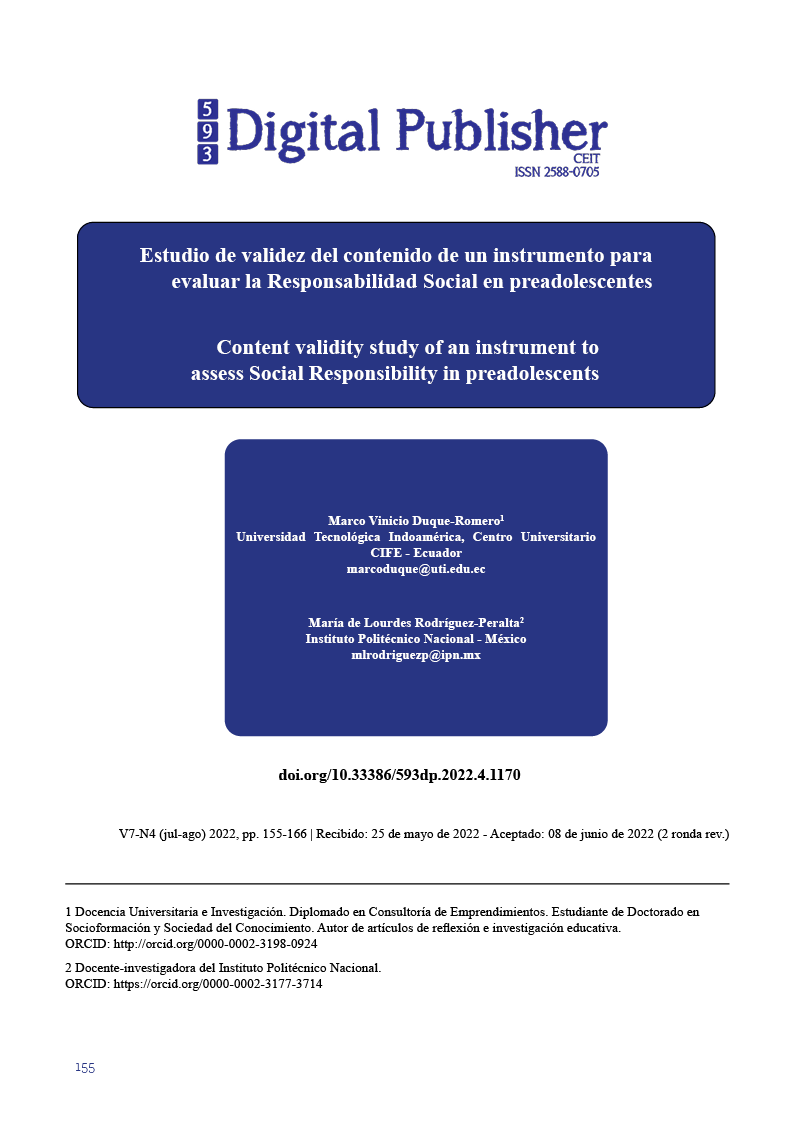Content validity study of an instrument to assess Social Responsibility in preadolescents
Main Article Content
Abstract
The great variety of instruments in the evaluation of social responsibility invites us to carry out an in-depth analysis about which instrument and process should be applied; It is convenient to propose and validate an instrument that adjusts to the approach proposed in the investigation of social responsibility in an educational context, of children and preadolescents. The purposes of this study are: 1) to design a pertinent and practical instrument to evaluate social responsibility in preadolescents, within the framework of socioformation; 2) carry out the content validation of the instrument with a group of judges, to determine its degree of relevance and theoretical coherence; and 3) determine the relevance and understanding of the questions through a pilot group. Methodology: An instrumental study of validity and reliability of an instrument to evaluate Social Responsibility in preadolescents in Basic Education was carried out. Results: The instrument presented adequate levels of content validity from the application in 10 judges (Aiken's V ≥0.7); 2) the exploratory and confirmatory factorial analysis showed 5 indices (KMO = 0.717; Sig. = 0.000; CMIN/DF = 2.263; CFI = 1.000; and, RMSEA = 0.000) that are within the expected values to validate the theoretical proposal of the instrument and its design. Conclusions: The instrument shows construct and construct validity.
Downloads
Article Details

This work is licensed under a Creative Commons Attribution-NonCommercial-ShareAlike 4.0 International License.
1. Derechos de autor
Las obras que se publican en 593 Digital Publisher CEIT están sujetas a los siguientes términos:
1.1. 593 Digital Publisher CEIT, conserva los derechos patrimoniales (copyright) de las obras publicadas, favorece y permite la reutilización de las mismas bajo la licencia Licencia Creative Commons 4.0 de Reconocimiento-NoComercial-CompartirIgual 4.0, por lo cual se pueden copiar, usar, difundir, transmitir y exponer públicamente, siempre que:
1.1.a. Se cite la autoría y fuente original de su publicación (revista, editorial, URL).
1.1.b. No se usen para fines comerciales u onerosos.
1.1.c. Se mencione la existencia y especificaciones de esta licencia de uso.
References
Abad-Corpa, E.; Sánchez-López, D. & Moreno-Casbas, M. T. (2020). Scoping review sobre las recomendaciones para el aislamiento domiciliario en la pandemia de COVID-19. Revista Científica Enfermería Clínica 31(2021) S94-S99., 31, S94–S99. https://doi.org/https://doi.org/10.1016/j.enfcli.2020.05.007
Aiken, L. (1980). Content Validity and Reliability of Single Items or Questionnaires. Educational and Psychological Measurement, 40(4), 955–959. https://doi.org/https://doi.org/10.1177/001316448004000419
LEY ORGÁNICA DE PROTECCIÓN DE DATOS PERSONALES, (2021). https://drive.google.com/file/d/1UhmqRQpkkBjWs5iGGiB_oOxKeRdaX2Ut/view
Berman Sheldon. (1997). Children’s social consciousness and the development of social responsibility. State University of New York Press.
Bolio-Domínguez, V.; Pinzón-Lizarraga, L. M. (2019). Construcción y Validación de un Instrumento para Evaluar las Características de laResponsabilidad Social Universitariaen Estudiantes Universitarios. Revista Internacional de Educación Para La Justicia Social, 2019, 8(1), 79-96, 8(1), 79–96. https://revistas.uam.es/riejs/article/view/riejs2019.8.1.005
Carmines, Edward and Zeller, Richard. (1979). Reliability and Validity Assessment. SAGE Publications. USA.
Cea, M.A. (2004). Análisis multivariable. Teoría y práctica en la investigación social. Madrid: Síntesis.
Daniel Licandro, O., Alvarado-Peña, L. J., Sansores Guerrero, E. A., & Navarrete Marneou, J. E. (2019). Corporate social responsibility: A typology of definitions | Responsabilidad social empresaria: Hacia la conformación de una tipología de definiciones. Revista Venezolana de Gerencia, 24(85).
Díaz, Y. ; Andrade, J. & Ramírez, E. (2019). Liderazgo Transformacional y Responsabilidad Social en Asociaciones de Mujeres Cafeteras en el Sur de Colombia. Información Tecnológica Vol. 30(5), 121-130 (2019), 30(5), 121–130. https://scielo.conicyt.cl/scielo.php?pid=S0718-07642019000500121&script=sci_arttext&tlng=en
Duque-Romero, M., & Rodríguez-Peralta, M. (2021). La responsabilidad Social en preadolescentes (10 a 12 años) de Educación Básica. 593 Digital Publisher CEIT, 6(6-1), 422-438., 6(6–1), 422–438. https://www.593dp.com/index.php/593_Digital_Publisher/article/view/824
Fernández-García, E., Sánchez-Bañuelos, F., & Salinero-Martín, J. J. (2008). Validación y adaptación de la escala PACES de disfrute con la práctica de la actividad física para adolescentes españolas. Psicothema, 20 (4), 890–895. https://www.psicothema.com/pdf/3571.pdf
Hernández-Ayala, H., Tobón, S., & Juárez-Hernández, L. (2021). Estudio de validez de contenido y confiabilidad de un instrumento para diagnosticar el proceso de inclusión en las Escuelas Normales. Diálogos Sobre Educación Año 12 | Número 22 | Enero-Junio 2021 | ISSN 2007-2171, 22. http://www.scielo.org.mx/pdf/dsetaie/v12n22/2007-2171-dsetaie-12-22-00017.pdf
Hu, L., & Bentler, P. (1995). Structural equation modelling: Concepts, issues and applications. Thousand Oaks, CA: Sage Publications. http://www.scielo.org.co/pdf/acp/v15n2/v15n2a02.pdf
Ibarra L., Fonseca, C. & Santiago, R. (2020). La responsabilidad social universitaria. Misión e impactos sociales. SINECTICA. Núm. 54. https://doi.org/doi: 10.31391/S2007- 7033(2020)0054-011
Kaiser, H. F. (1974). An index of factorial simplicity. Psychometrika, 39(1), 31–36. https://doi.org/10.1007/BF02291575
Martin-Romera, A.; Molina-Ruiz, E. (2017). Valor del conocimiento pedagógico para la docencia en Educación Secundaria: diseño y validación de un cuestionario. Estudios Pedagógicos XLIII, N° 2: 195-220, 2017, XLIII(2), 195–220. https://scielo.conicyt.cl/pdf/estped/v43n2/art11.pdf
Martínez-Usarralde, M.-J., Gil-Salom, D., & Macías-Mendoza, D. (2019). Revisión sistemática de responsabilidad social universitaria y aprendizaje servicio: Análisis para su institucionalización. Revista Mexicana de Investigacion Educativa, 24(80), 149–172.
Matas, A. (2018). Diseño del formato de escalas tipo Likert: un estado de la cuestión. Revista Electrónica de Investigación Educativa, 20(1), 38-47. https://doi.org/10.24320/redie.2018.20.1.1347
Montero, I. y León, O. (2002). Clasificación y descripción de las metodologías de investigación en Psicología. Revista Internacional de Psicología Clínica y de La Salud Vol. 2 (3), Pp. 503-508, 2(3), 503–508. http://www.aepc.es/ijchp/articulos_pdf/ijchp-53.pdf
Muñoz-Murcia, Ruiz-Acosta Liliana Elizabeth; Camargo-Mayorga, D. A., & Marcela, N. (2020). Relación entre responsabilidad social empresarial y rentabilidad: una revisión de literatura. Encuentros, 18(02), 128-141, 18(2), 128–141. https://dialnet.unirioja.es/servlet/articulo?codigo=7772902
Noguera-López, M. Y. (2020). Responsabilidad Social Organizacional: estado del arte y tendencias. Revista Gestión y Desarrollo Libre, 5(10), (142-161)., 5(10), 142–161. http://ns1.unilibrecucuta.edu.co/ojs/index.php/gestionyd/article/view/492
Nunnally, Jum C. Jr. (1970). Introduction to Psychological Measurement. McGraw Hill. Japan.
Otoya-Tono AM, García M, Jaramillo-Moncayo C, Wills C, C. A. (2020). COVID-19: generalidades, comportamiento epidemiológico y medidas adoptadas en medio de la pandemia en Colombia. Acta Otorrinolaringol. Cir. Cabeza Cuello. 2020; e-Boletín (Abril): 4-13, 4–13. https://www.revista.acorl.org.co/index.php/acorl/article/view/475/383
Sáenz-Pulgar, K. (2019). CONSTRUCCIÓN Y EVALUACIÓN DE VALIDEZ DE CONTENIDO DE UN CUESTIONARIO PARA EVALUAR COMPORTAMIENTOS SOCIALMENTE RESPONSABLES EN DOCENTES DE CARRERAS DE LA SALUD DE UNA UNIVERSIDAD TRADICIONAL DE CHILE [UNIVERSIDAD DE CONCEPCIÓN]. http://152.74.17.92/handle/11594/731
Tobón, S. (2012). El proyecto ético de vida y la socioformación. Instituto CIFE, Centro Universitario. Centro Universitario. Cuernavaca – México. https://issuu.com/cife/docs/e_book_el_%0Aproyecto_etico_de_vida_y_
Tobón, Sergio. (2017). Ejes esenciales de la sociedad del conocimiento y la socioformación (2017th ed.). Mount Dora (USA): Kresearch. https://doi.org/dx.doi.org/10.24944/isbn.978-1-945721-18-2



